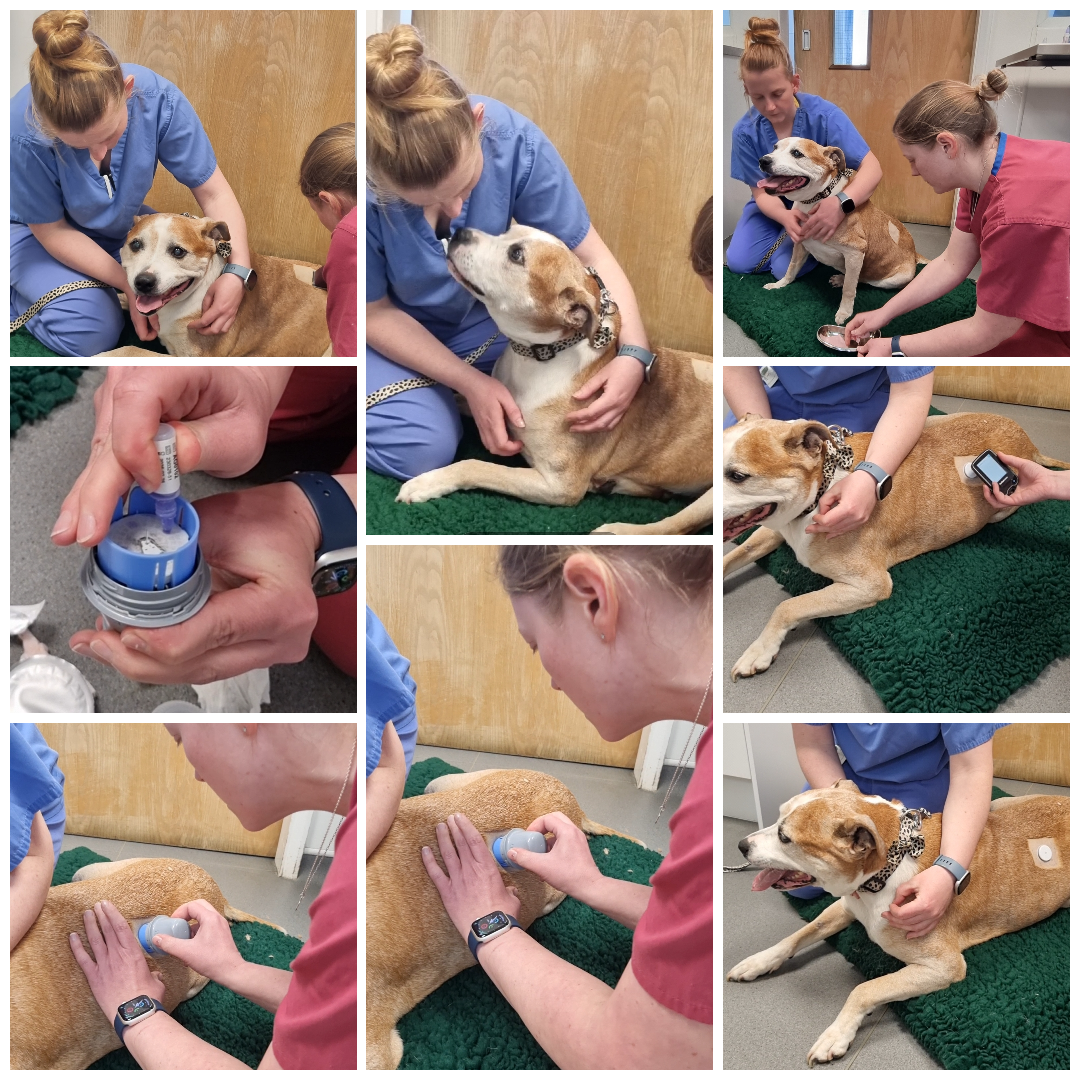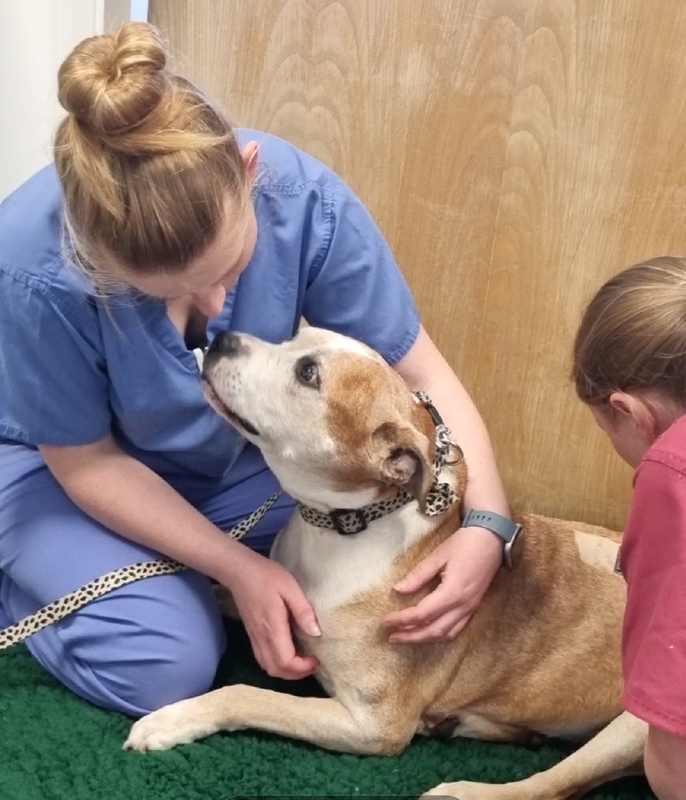Phoebe, a lovely 12 year old Staffordshire Bull Terrier (pictured here and below!) has had her device place. Her readings will be recorded at home, on the owner's mobile through the device app then shared with us. Our diabetic nurse, Kayleigh assisted by Nurse Steph, clipped a small patch of Phoebe's fur and cleaned the area ready for sterile placement. Surgical tissue glue was also used to keep the device secure. While these are comfortable to wear, Nurse Kayleigh advised a medical t-shirt for extra comfort. Phoebe was such a great girl and enjoyed lots of fuss!

Diabetes a common condition in dogs
- Diabetes is a common condition in dogs and while incurable it is manageable, but generally costly to treat. Once stabilised and under an ongoing monitored treatment plan, patients really can lead a very happy active life. If left untreated, diabetes can cause other health issues so diagnosis and treatment are important for your dog's health.
- Diabetes affects dogs in the same way as people - the pet's pancreas isn't producing enough or even any insulin, or isn't responding to the insulin hormone. We all need insulin to absorb sugar (glucose) from the bloodstream after eating, glucose is then transported to cells around the body.
- With diabetes this lack of sugar control in the blood leads to hyperglycaemia. Dogs will be able to cope with this for a while but will become seriously unwell and can acquire a number of other equally serious health problems.
- Dogs with diabetes suffer from the type 1 form of the condition in almost all cases. If the pet is unable to produce the required insulin, they will need treatment for the rest of their life.
Signs of diabetes in dogs
Your dog may experience some or all of these signs: excessive drinking, increased urination, hunger and weight loss.
If the insulin isn't present, glucose can't be used by the body and so lost into the urine. In effect the dog isn't receiving enough calories - the body's response to this is to start breaking down the dog's fat reserves, leading to weight loss.
If the insulin isn't present, glucose can't be used by the body and so lost into the urine. In effect the dog isn't receiving enough calories - the body's response to this is to start breaking down the dog's fat reserves, leading to weight loss.
Diagnosis and treatment of diabetes in dogs
Blood and urine tests are used to confirm and monitor diabetes. Stress can increase the amount of circulating glucose in the blood and may produce inaccurate results. If this is the case, our vets will also test fructosamine levels as well as glucose. This will give an indicator of the the pets previous 2-3 weeks blood glucose levels. Diabetes is treated with daily insulin injections - the type and dose will be advised by your vet. It may take some time to reach the required dose for your pet and their own routine of feeding and exercise. Most dogs will need twice daily injections, 12 hours apart after their meal. You will be advised when your pet's glucose levels need to be checked and/or monitored at home.
STICKING TO THEIR ROUTINE IS IMPORTANT FOR ONGOING HEALTH AND STABILISATION - including consistency with their insulin injections and feeding plan.
Our owners are often concerned about starting this process and giving their pet injections, but we are here to help and alongside your vet and our Diabetic Nurse Kayleigh we can support and advise you. You will soon get the hang of it!
STICKING TO THEIR ROUTINE IS IMPORTANT FOR ONGOING HEALTH AND STABILISATION - including consistency with their insulin injections and feeding plan.
Our owners are often concerned about starting this process and giving their pet injections, but we are here to help and alongside your vet and our Diabetic Nurse Kayleigh we can support and advise you. You will soon get the hang of it!
Is your dog's insulin injections working?
We will advise you of the necessary check-ups to support you and your pet through this lifelong condition - but always contact us if you feel your dog seems unwell. This includes any change in your pet's appetite or thirst. If your pet becomes uncoordinated, dizzy or seems not with it then this is an emergency - contact us immediately as it could indicate their blood sugar levels have dropped dangerously low.
Diet is important
You may be advised to change your dog's diet to help regulate their blood sugar levels, e.g. a high fibre diet - but whatever balanced diet is chosen, we will advise what is best for your pet, including how much to feed and the timing of each meal with injections. Human titbits should not be fed to diabetic pets due to their affect on the glucose levels.
Lifelong care
Once your pet is stabilised and their treatment plan consistently in place, your pet can lead a happy active life. There are a number of health problems that diabetic dogs can be more prone to develop. This can include cataracts and urinary tract infections. It's important to note that cleaning your dog's teeth a necessary part of maintaining their health, as mouth infections can cause their blood sugar to rise.
If your pet is insured, treatment for diabetes is likely to be covered. Please talk to your insurance company and us for further information. If your dog has our MVP Care Plan, you will automatically receive a 25% discount on your insulin purchases, for further information click here.
If your pet is insured, treatment for diabetes is likely to be covered. Please talk to your insurance company and us for further information. If your dog has our MVP Care Plan, you will automatically receive a 25% discount on your insulin purchases, for further information click here.
Preventing diabetes?
While canine diabetes can't always be prevented, we can make life choices for our dogs to keep them happy and healthy. Regular vet health examinations, seeking advice when you feel your pet is under the weather and keeping a regular check on their weight and body condition is always advised.
If you are concerned about your dog's health, please contact us.

